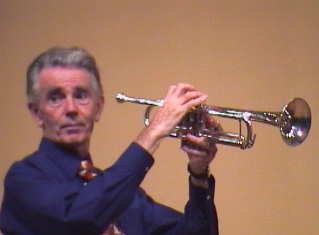 |
 |
| 【1997年NABEOにて】 | 【1997年NABEOにて】 |
|
Philip Jones passed away
|
 |
 |
| 【1997年NABEOにて】 | 【1997年NABEOにて】 |
2000年1月20日の朝、メンバーの一人から、KFABメーリングリストに衝撃のニュースが走った。
フィリップ・ジョーンズ氏は、今の金管奏者にとって随分多くの良い影響を与えた人であり、金管音楽の幅を広げた人でもある。その功績とお人柄には、畏敬の念と憧れを持っている人も多くいることであろう。事実、KFABメンバーの中にも、フィリップ・ジョーンズ・ブラス・アンサンブル(PJBE)の影響を受け、深くアンサンブルの世界に引き込まれた者もたくさんいる。彼らの演奏は、音楽の楽しみ方を我々に与えてくれると共に、憧れ、かつ、目標として我々の心に深く残っている。
1997年10月、日本アマチュアブラスアンサンブル組織が企画するブラスアンサンブルフェスティバルのゲストとして、フィリップ・ジョーンズ氏が来日した。ジョーンズ氏が聞くステージでの演奏、ジョーンズ氏のクリニック、そして、ジョーンズ氏との宴会、今思えば、あの愛媛今治での3日間は夢のような時間であった。まさに、あれがジョーンズ氏と直接お会いできるラストチャンスであり、お会いできて本当に幸せであった。我々KFABメンバーにとって、一生忘れることはないであろう。
ジョーンズ氏の訃報に接し、謹んで哀悼の意を表したいと思います。
京都ファインアーツ・ブラスホームページより
「フィリップジョーンズ氏が死去されたそうです。享年71歳」
新聞記事によると、1月17日死去。71歳。死因と死亡場所は明らかにされていないらしい。日本では、新聞記事として取り上げられることが少なかったようだが、メンバーの調査によると関西版の全国紙3紙(朝日・読売・毎日)と産経、京都新聞の20日朝刊・夕刊、21日朝刊を調べて、載っていたのは読売の20日夕刊だけだという。
ご冥福をお祈りいたします。
The Guardian(記事より転載)
http://www.newsunlimited.co.uk/obituaries/story/0,3604,124120,00.html
Philip Jones
Gifted trumpeter who opened the world of chamber music to brass instruments
Wednesday January 19, 2000
The stereotypical brass player - northern, overweight, blunt and beer-loving - is still the concertgoer's most cherished misconception. Philip Jones, who has died aged 71, lived elegantly in St John's Wood, London, and in Switzerland; he was slim, carefully spoken and immaculately dressed; and he fought against this caricature until his Philip Jones Brass Ensemble was playing the same venues, and receiving the same critical attention, as the finest string quartets.
Occasionally appearing in front of the orchestra as soloists, brass instruments are generally assumed to be a backing act. Philip worked tirelessly to establish them as a medium that could hold centre stage, by themselves, for a whole evening.
Few brass players of recent generations can have escaped benefiting from his influence - whether by playing works he commissioned, studying at one of the three music colleges where he held senior positions, or enjoying the new credibility afforded to brass chamber music that he wrested out of the "posh" musical establishment. With his ensemble, he made more than 50 recordings and gave 87 world premieres. He had 71 works written especially for him.
Born in Bath and brought up in a London family of trumpeters, Philip won a scholarship to the Royal College of Music. During the next 25 years, he held the position of principal trumpet in six London orchestras - a unique achievement, but still not his real ambition. In 1947, he heard a performance of brass chamber music, rare at that time, by four players from the Concertgebouw Orchestra, which started him on the path he followed until retirement in 1986.
In 1951 he formed a quartet, the first group to bear the name of the Philip Jones Brass Ensemble, already with its first piece of specially commissioned music. At this time, a group of brass instruments, no matter how distinguished its members, was still seen as a "brass band", only to be considered for open-air music, accompaniments to singers, or ceremonial performances.
Philip's reaction to this was typical of him: not to bemoan it or rail against it, but over the years to acquire new repertory, promote his own concerts, seek out engagements and refine the group's performances into something that would persuade promoters and public to think again.
The group expanded in 1963 into a quintet of two trumpets, horn, trombone and tuba. As its prestige grew, Philip was able to employ in it the cream of Britain's brass soloists; two considerable musicians to join were Elgar Howarth, whose enthusiasm for 20th-century music had a great influence, and John Fletcher, tuba icon and musical polymath, whose loyalty and quirky humour lightened Philip's load immensely.
As performance opportunities multiplied through the 1970s, the ensemble grew in size until it settled on the combination of four trumpets, four trombones, horn and tuba. This particular grouping, rich and varied in sound, had a unique sonority, born of fastidious attention to the details of balance, intonation and nuance, immediately recognisable by brassmen and laymen alike. It achieved unprecedented popularity, performing nearly 100 engagements a year in the 1980s across Europe, the United States, Japan and Australia.
This acclaim was not derived wholly from polished performance standards. Philip was the master programme-planner, every minute being evaluated in terms of its demands on both players and audience (or "customers" as he preferred them to be called). "Middle of the road", often used disparagingly, would be unlikely to cause any offence to Philip, a pragmatist who knew exactly where his act was positioned. He was not drawn by instinct to the avant-garde, unless the music was carefully and idiomatically written for the instruments. Those of us who made his transcriptions of classical and romantic music sometimes had to rein back his enthusiasm - to convince him, for example, that a suite of Chopin piano pieces arranged for brass was not one of his better ideas.
He was adamant that instrumental pyrotechnics should not form a substantial part of his programme, content just to tease the audience with an encore that would highlight the brilliance of one of his team, but never himself. His willingness to push others to the fore makes even more remarkable his achievement of blending 10 top players into the "Philip Jones" sound. In fact, in the years before his retirement, he became much less prominent as soloist or front man, while the ensemble became even more stamped with his personality.
The huge amount of administration for concert tours and recordings was shared by Philip's wife, Ursula Strebi, but he shouldered all the musical preparation himself, leaving his players free to concentrate on their performance. While we were enjoying a pre-concert meal, Philip could always been found sitting alone on the stage, carefully positioning everyone's music, lining up the stands, and checking sight lines.
After retirement from playing, he continued a full life as teacher, administrator and adjudicator, a role that took him around the world. He was principal of the Trinity College of Music from 1988-94. Among his many honours were fellowships from several music colleges and the Royal Society of Arts, the Composers Guild Award, the CBE, and freedom of the City of London. He was a member of the Arts Council and chairman of the Musicians Benevolent Fund.
Philip leaves behind no musical foundation or playing method; he wrote no treatise or textbook, being content to let his music speak for itself. His legacy is to be heard on recordings, and in the sonorous elegance of the best of British brass playing.
He is survived by his wife and sister.
Christopher Mowat
Philip Mark Jones, musician, born March 12 1928; died January 17 2000